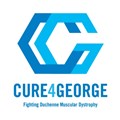Story
George was our first born son, entering the world on a leap year on 29th February 2008 - he was perfect!
As he started to reach development milestones, he was slower than his peers, but professionals advised there was nothing to worry about so we didn't think anything of it. As a toddler he tripped up regularly, and when he started school he found it difficult to concentrate and was slower at learning. George developed large calf muscles and people would comment to us what amazing muscle definition he had, asking what sports he played! Little did we know that these were key signs of Duchenne!
George was a late diagnosis at age 8 and in junior school, and we started to see him struggle more. Keeping up with his friends, his younger brother Jack, getting up from the floor and climbing stairs were getting difficult. We had watched George in his first junior school sports day and it was very evident that something was wrong!
George was referred to our local hospital in September 2016. We were comforted to hear that the consultant didn't believe it was neurological and felt a bit more relaxed. However, a blood test and a second opinion from a paediatric consultant started to reveal the heart-breaking news. We were referred to Great Ormond Street Hospital, where the formal diagnosis for Duchenne was confirmed on 9th November 2016. Totally heartbroken, our life journey changed from that point on.
There was no history in our family and no explanation why this was happening to George. We were so heartbroken, and cried so much. We didnt think the crying would ever stop, and the overwhelming sadness and sudden emptiness of grief was unbearable.
After diagnosis, life quickly developed into endless hospital appointments and tests, physio assessments, occupational therapist assessments in school and at home for adaptions and support needed, night splints, steroids, muscle biopsy, learning assessments and support, school meeting to support an EHCP, endless paperwork for Disability Living Allowance, disabled badge, wheelchairs and medication like steroids. Everything was a bit of a whirlwind!
Gradually things calmed down and we directed our grief into fundraising. We now run an annual spring golf day with 100 golfers supporting us, and we have lots of supportive family and friends who help us with fundraising events.
We have hope for the future, and scientists are so close now to helping boys (and girls) with Duchenne. We came across the charity Duchenne UK after attending their patient information days and seeing all the great work and research projects they are funding to make a difference. We also wanted our fundraising to go towards research projects of our choice to help make a difference for George.
As for life in general now, we live in the moment - day by day, month by month. We enjoy it more than ever, creating fond family memories together and appreciating the smaller things in life that we previously perhaps took for granted. We know we will have some very difficult times ahead, but we are a strong family unit together for George, and his brother Jack. We explain age related information about Duchenne to George to help him understand what is happening to his body as things start to change and why his legs don't work like his friends.
Life does go on after Duchenne diagnosis. Its not easy and its a very different journey to the one we had planned for our family, but weve adapted as best as we can, and will always continue our fight to #EndDuchenne.
Kerry and John Shippey (George's Mum and Dad)
 Campaign by
Campaign by 